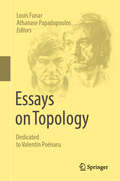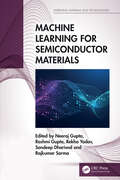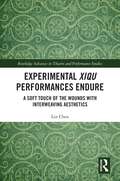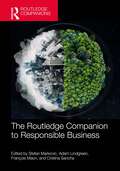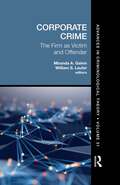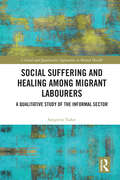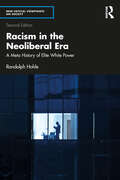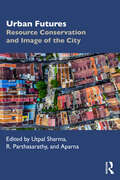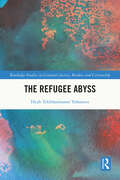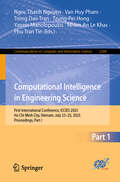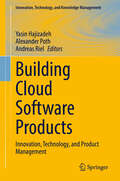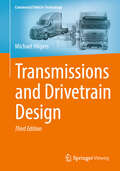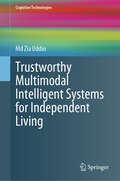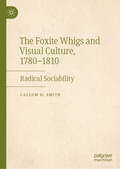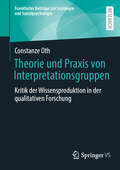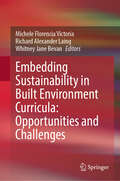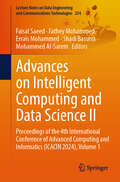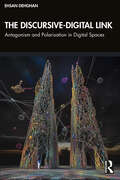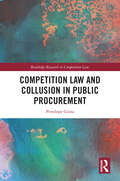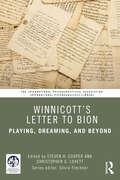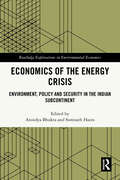- Table View
- List View
Essays on Topology: Dedicated to Valentin Poénaru
by Athanase Papadopoulos Louis FunarThis book consists of a collection of articles dedicated to Valentin Poénaru, on topology and geometry in a broad sense. Poénaru is one of the leading mathematicians whose work had an essential impact on the development of topology in France over the last forty years of the twentieth century. The special topics addressed in this volume include hyperbolic geometry, 3-manifolds, complex and symplectic geometry, differential topology, combinatorial group theory, piecewise-linear topology, algebraic geometry, knots and links, homotopy theory, braid groups, phylogenetics, the history of geometry, and the philosophy of mathematics. This collection of articles, written by well-known researchers, provides a lively insight into a number of current research topics in geometry and topology.
Colonial Scholasticism: Interpreting Nature, Society, and Philosophy in Spanish America (Global Perspectives on the History of Natural Philosophy)
by Nicola Polloni Abel Aravena ZamoraColonial Scholasticism: Interpreting Nature, Society, and Philosophy in Spanish America explores the enduring influence of scholasticism beyond Europe, tracing its evolution in the intellectual and educational institutions of colonial Latin America.Far from being a mere extension of European thought, colonial scholasticism developed in response to new cultural, political, and scientific contexts, engaging with both local realities and global philosophical traditions. This volume examines the emergence and adaptation of scholastic philosophy in Spanish America, from the establishment of schools and universities to the development of novel approaches to law, science, and theology. It explores how the works of Aristotle and his ancient and medieval followers continued to shape intellectual discourse in the American world. At the same time, it highlights how these traditions were reinterpreted in dialogue with Indigenous knowledge, social structures, and the challenges posed by colonial rule. Bringing together contributions from leading scholars in the field, Colonial Scholasticism sheds light on a neglected chapter in the history of Western philosophy. It challenges Eurocentric periodisations that confine scholasticism to the Middle Ages and demonstrates its continued relevance in shaping philosophical and scientific thought well into early modernity.This book is an essential resource for historians of philosophy, scholars of Latin American intellectual history, and all those interested in the global dimensions of scholasticism.
Machine Learning for Semiconductor Materials (Emerging Materials and Technologies)
by Neeraj Gupta Rashmi Gupta Rekha Yadav Sandeep Dhariwal Rajkumar SarmaMachine Learning for Semiconductor Materials studies recent techniques and methods of machine learning to mitigate the use of technology computer-aided design (TCAD). It provides various algorithms of machine learning, such as regression, decision tree, support vector machine, K-means clustering and so forth. This book also highlights semiconductor materials and their uses in multi-gate devices and the analog and radio-frequency (RF) behaviours of semiconductor devices with different materials.Features: Focuses on semiconductor materials and the use of machine learning to facilitate understanding and decision-making. Covers RF and noise analysis to formulate the frequency behaviour of semiconductor devices at high frequency. Explores pertinent biomolecule detection methods. Reviews recent methods in the field of machine learning for semiconductor materials with real-life applications. Examines the limitations of existing semiconductor materials and steps to overcome the limitations of existing TCAD software. This book is aimed at researchers and graduate students in semiconductor materials, machine learning and electrical engineering.
Experimental Xiqu Performances Endure: A Soft Touch of the Wounds with Interweaving Aesthetics (Routledge Advances in Theatre & Performance Studies)
by Lin ChenThis book offers a detailed, comprehensive, and theoretically grounded study of experimental xiqu performances that have taken place in recent decades across Mainland China, Hong Kong, Taiwan and online platforms.Situating these performances within their specific socio-political contexts and historical trajectories, this book explores the question, what defining aesthetics and methodologies characterise experimental xiqu practices, and how do they distinguish themselves from traditional xiqu aesthetics and the ‘intercultural theatre’ paradigm epitomised by the ‘Western story, Eastern body’ approach? A performative theoretical framework is developed to facilitate a thorough examination of the evolution of xiqu from the last millennium to modern times, with particular focus on the 20th century. The primary objectives of this investigation are twofold: to establish a nuanced understanding of the dynamic and non-dualistic concept of ‘traditional xiqu’, and to provide a vivid depiction of the diverse soils shaping various experimental xiqu performances. Focusing on aesthetics, this book further conducts detailed performance analyses of The Outcast General, Metamorphosis, Sighing and The Spirits Play Online. This book contends that experimental xiqu performances reveal the deep wounds borne by a significant number of ordinary people. Owing to the discourse of ‘beauty’ surrounding xiqu, the institutional constraints, the dualistic political discourses and, most of all, the as-yet-unconstructed condition of collective cultural trauma within these contexts, all the wounds are touched ‘softly’. Experimental xiqu performances help endure the deep wounds and the unarticulated cultural traumas.This book will be of great interest to theatre, performance and opera studies scholars and students.
The Routledge Companion to Responsible Business (Routledge Companions in Business, Management and Marketing)
by Adam Lindgreen François Maon Stefan Markovic Cristina SanchaContemporary companies are expected to behave ethically and responsibly toward their stakeholders and to provide social and environmental good. Key stakeholder groups, including employees, consumers, investors, and public authorities, increasingly demand that companies deliver products and services in responsible yet economically sound manners and act in accordance with moral obligations and financial requirements. Such mounting societal expectations and institutional pressures relate to complex concerns, including environmental and climate impact, working conditions, and human rights, both locally and oversees. In this context, as companies now appear to commit to comprehensively tackle ethical, social, environmental, and economic challenges, concerns increasingly are raised as to whether most companies in the end can indeed contribute to societal and environmental good and transform how they operate to create value responsibly, considering the success and impact of so called corporate social responsibility or sustainability policies.In recent decades, while some companies have advanced on their social and environmental responsibility journey, other companies have engaged in ethical, social, and environmental initiatives in manipulative and insincere way, or merely as a rhetorical tool to maintain legitimacy. Together with governments and business partners, these companies are largely failing to deliver for society and the environment. Subsequently, more than ever before, understanding what it means to do business responsibly and how business actors can engage constructively in ways that support the development of resilient business practices, forms, and organizations that contribute to generate positive impact for society and the environment and generate the type of economic value needed to address the key challenges of this century is central.On this background, this edited volume sheds light on different crucial themes and approaches spanning historical, conceptual, operational, critical, practical, and prospective considerations that have animated the field of business and society in the last decades, and that are instrumental or have the potential to drive constructive research discussions and business efforts.The central aim of the book is to set the research agenda for the next five to seven years, to redefine existing areas within the context of international research, and to highlight emerging research areas in need of further investigation, representing a prestige reference work providing an overview of the subject area of responsible business, primarily for academics, researchers, postgraduate students, as well as reflective practitioners.
Corporate Crime: The Firm as Victim and Offender (Advances in Criminological Theory)
by William S. Laufer Miranda A. GalvinThis volume speaks to the fundamental issues inherent in trying to understand the who-what-where-and-whys of corporate crime. Only in addressing these larger issues does it become possible to begin to integrate the study of corporate crime into the larger criminological theory literature. A collection of chapters by experts in the field grapples with three deceptively simple questions: When are firms morally and legally responsible agents? What are the harms of corporate wrongdoing and who are the victims? What theories offer insight to explain corporate wrongdoing? In the first section, chapter authors wrestle with what it means for a corporation to have agency enough to commit a violation of law as well as what philosophies of punishment might apply when there is no body to jail. The second section focuses attention on the often unnamed, ambiguous, or even ignored victims of corporate crime. Many authors in this section take a broad view of “victimization,” speaking to the ways in which the intentional acts of corporations produce negative consequences for individuals and society at large through both the violation of law and the use of corporate power to produce laws that do not problematize corporate behavior. The third section turns to issues in corporate offending research, including the circumstances that beget offending, how corporations may be thought to have “life courses,” and the role of the State in structuring criminal opportunity. The editors wrap up the volume by proposing a framework for developing a more comprehensive system of criminal responsibility for corporate actors.The chapters in this volume underscore the failures of the current system and are intended to inspire readers to push for change. This important work will be of interest to a wide range of criminologists and has potential to shape the future of corporate crime theory and research. It is ideal for use in graduate seminars and upper-level undergraduate courses.
Social Suffering and Healing among Migrant Labourers: A Qualitative Study of the Informal Sector (Critical and Qualitative Approaches to Mental Health Experiences among Vulnerable Groups)
by Sangeeta YadavThe book uncovers the nuances of the lives of unskilled migrant labourers in India. The qualitative approach, along with the social constructivist paradigm and ethnographic fieldwork demonstrates the nature of scientific inquiry carried out in this work. The data analysis methods supporting the narratives will not only help readers understand the experiences of the migrant communities but will also facilitate a bond of empathy with the participants.Taking a bottom-up approach, the book explores how migrant labourers’ suffering, and their sense of wellbeing are deeply embedded in their existing surroundings. It throws light on the numerous communities across the world that are at high risk of developing mental health related problems due to existing socio-political conditions.The book will be useful to the students, researchers, and teachers of Sociology, Social Work, Anthropology, Psychology, Political Science, Economics, Public Policy and Administration. It will be especially be useful to mental health professionals, social workers and NGOs engaging with migrant or other marginalized communities.
Racism in the Neoliberal Era: A Meta History of Elite White Power (New Critical Viewpoints on Society)
by Randolph HohleRacism in the Neoliberal Era explains how simple racial binaries like black/white are no longer sufficient to explain the persistence of racism, capitalism, and elite white power. The neoliberal era features the largest Black middle class in US history and extreme racial marginalization. Racial languages change the meaning of public and private – political economy’s two fundamental terms. Randolph Hohle focuses on how the origins and expansion of neoliberalism depended on a racial language of white-private/black-public. The language of neoliberalism explains how the white racial frame operates like a web of racial meanings that connect social groups with economic policy, geography, and police brutality. When America was racially segregated, elites consented to political pressure to develop and fund white-public institutions. The Black civil rights movement eliminated legal barriers that prevented racial integration. The elite white response to Black civic inclusion was to deregulate the Voting Rights Act and banking policy. Elites gave themselves tax cuts and implemented austerity measures on government programs to aid the poor. They privatized neighborhoods, schools, and social welfare, creating markets around poverty. They oversaw the mass incarceration and systemic police brutality against people of color. Citizenship was recast as a privilege instead of a right. Neoliberalism is the result of an elite white meta-strategy to maintain political and economic power.This new edition is thoroughly revised and updated to take account of the further history and debates over neoliberalism in the Trump and Biden eras and the significant social and political discussions around race and racism, policing, housing, health care, and citizenship as they interconnect with the American neoliberal economic and political system. The new edition will be a vital textbook for students, instructors, and researchers in sociology, politics, race, and economics.
Urban Futures: Resource Conservation and Image of the City
by R. Parthasarathy Utpal SharmaThis book explores the built environment through aspects of spatial planning, ecology, infrastructure, and urban identity. By presenting case studies from both developed and developing nations, the chapters reveal the interconnectedness of urban spaces with socio-economic and cultural dynamics, in addition to ecology and the environment.Urban areas and cities are key players in boosting economic development and enhancing social welfare. Nonetheless, the swift pace of urbanisation presents intricate challenges and obstacles in creating inclusive, sustainable, and resilient living spaces that are modern and capable of accommodating the growing needs of urban populations. This book probes various issues, interventions, and designs from diverse cities, diving into the specifics of sector-related concerns and new insights pertaining to land use planning and its implications, urban design frameworks, green and blue infrastructure, informal settlements, sustainability through resource conservation, transportation modelling, waste management, and ultimately, the image of the city.This book will be advantageous and appealing to students and researchers involved in the built environment, urban planning and design, heritage and vernacular identity, infrastructure, nature-based solutions, and urban studies. It will also attract the attention of professionals and policymakers associated with these fields who are engaged in shaping urban futures.
The Refugee Abyss (Routledge Studies in Criminal Justice, Borders and Citizenship)
by Hyab Teklehaimanot YohannesIn defiance of the refugee abyss, this book presents the flesh of pained bodies and the breath of displaced voices, contributing to the thread of traces yet to be forged and the politics yet to emerge, in a world where Relation takes precedence. The book unfolds in several traces. First, open wounds and scars represent the refugee abyss, revealing the onto-epistemic chains that silence displaced voices. These voices, through embodied subjects, recount their struggles in a world marked by violence. Second, the book questions the rights-based order, revealing how the human rights project is a new incarnation of the colonial civilising mission. It claims to elevate humanity, starting with those deemed uncivilised. Yet, its mask of benevolence, once upheld in the metropoles of empire, now appears hollow. Third, the book theorises the nationstate as a womb-abyss, a matrix that both births and consumes life. Fourth, it explores the refugee abyss as a realm of confinement and destitution, where lives are commodified, exploited, and destroyed. Fifth, it shifts from open wounds to the poetics of refuge, illustrating how life persists in the shadows of rights and laws, while death is inflicted through them. Finally, it reflects on untamed life, emerging from wounds and scars as a proclamation of the unfamiliar and enduring.This book will be of interest to students and scholars of criminology, criminal justice, and refugee studies. It will also appeal to political scientists and policymakers interested in issues of citizenship, human rights, and decoloniality.
Classical Mechanics: A Computational Approach with Examples Using Mathematica and Python
by Vasilis Pagonis Christopher W. KulpClassical Mechanics: A Computational Approach with Examples using Python and Mathematica provides a unique, contemporary introduction to classical mechanics, with a focus on computational methods. In addition to providing clear and thorough coverage of key topics, this textbook includes integrated instructions and treatments of computation.This newly updated and revised second edition includes two new appendices instructing the reader in both the Python and Mathematica languages. All worked example problems in the second edition contain both Python and Mathematica code. New end-of-chapter problems explore the application of computational methods to classical mechanics problems.Full of pedagogy, it contains both analytical and computational example problems within the body of each chapter. The example problems teach readers both analytical methods and how to use computer algebra systems and computer programming to solve problems in classical mechanics. End-of-chapter problems allow students to hone their skills in problem solving with and without the use of a computer. The methods presented in this book can then be used by students when solving problems in other fields both within and outside of physics.It is an ideal textbook for undergraduate students in physics, mathematics, and engineering studying classical mechanics.Key Features: Gives readers the "big picture" of classical mechanics and the importance of computation in the solution of problems in physics Numerous example problems using both analytical and computational methods, as well as explanations as to how and why specific techniques were used Online resources containing specific example codes to help students learn computational methods and write their own algorithms A solutions manual is available via the Routledge Instructor Hub and all example codes in the book are available via the Support Material tab, and at the book’s GitHub page: https://github.com/vpagonis/Classical_Mechanics_2nd_Edition
Computational Intelligence in Engineering Science: First International Conference, ICCIES 2025, Ho Chi Minh City, Vietnam, July 23–25, 2025, Proceedings, Part I (Communications in Computer and Information Science #2584)
by Tzung-Pei Hong Ngoc Thanh Nguyen Yannis Manolopoulos Van Huy Pham Trong Dao Tran Nhien An Le Khac Phu Tran TinThis four-volume set constitutes the refereed proceedings of the First International Conference on on Computational Intelligence in Engineering Science, ICCIES 2025, in Ho Chi Minh City, Vietnam, during July 23–25, 2025. The 115 full papers presented in these proceedings were carefully reviewed and selected from 210 submissions. The papers are organized in the following topical sections: Part I: Machine Learning; Wireless Networks (6G)Part II: Computer Vision; Natural Language ProcessingPart III: Intelligent Systems; Internet of ThingsPart IV: Machine Learning; Control Systems
Building Cloud Software Products: Innovation, Technology, and Product Management (Innovation, Technology, and Knowledge Management)
by Alexander Poth Andreas Riel Yasin HajizadehCloud-native approaches have become essential in IT and OT product development. Cloud-native is more than using the newest cutting-edge services from hyperscalers. Building cloud products benefits from a holistic approach beyond focusing on an isolated cloud paradigm. This book addresses the different aspects of designing, building, and running cloud software products and services from a holistic perspective. It investigates how to empower cloud product and service teams to consider the relevant aspects for long-term success. It provides an overview of selected technologies and practical adoptions and explores various requirements to maintain economic and environmental sustainability. It examines the challenges faced by product management teams of cloud providers, independent software vendors (ISVs), and system integrators (SIs) and offers potential solutions. The chapters also showcase internal success stories and case studies of various companies during the lifecycle of a cloud product. Offering a combination of advanced research from academia and practical industry lessons learned, this book empowers cloud product and service teams to consider and adopt various ideas, concepts, and methods to provide successful, high-quality cloud products and services.
Structural Safety Early Warning and Treatment Technology of Metro Tunnel in Soft Soils (Key Technologies for Tunnel Construction under Complex Geological and Environmental Conditions)
by Dongmei Zhang Rulu Wang Chunsheng Guo Jingya YanThis book mainly focuses on two topics: • The early warning system of the metro structural safety, which includes the monitoring system and inspection system; • The treatment technology for the tunnel disease. In the discussion of the early warning system, several advanced sensing technologies were introduced, which could easily and rapidly detect the potential diseases of the tunnel lining structure. Meanwhile, in the discussion of the treatment technology for the structural problems, several reinforcement measures were introduced in details and corresponding application cases in East China were put out to verify the effects of the measures. From this book, practitioners in the maintenance and repair of metro structures could learn the deformation mechanisms and help address the practical issues they encounter.
Transmissions and Drivetrain Design (Commercial Vehicle Technology)
by Michael HilgersThe aim of this work, consisting of 9 individual, self-contained booklets, is to describe commercial vehicle technology in a concise and illustrative way. Compact and easy to understand, it provides an overview of the technology that goes into modern commercial vehicles. Content of this volume This volume, Transmissions and Drivetrain Design, begins with an explanation of how driving resistance and the engine characteristics factor into the configuration of the transmission and transmission ratios. The transmission and its associated assemblies are presented in detail, providing a clear understanding for training and practical applications. Other components of the drivetrain such as the propeller shaft, the clutch and the retarder are also discussed.
Trustworthy Multimodal Intelligent Systems for Independent Living (Cognitive Technologies)
by Md Zia UddinThis book is an essential guide for anyone interested in how artificial intelligence can enhance the quality of life for individuals who wish to maintain autonomy in their own homes. The author begins by introducing the reader to AI applications in independent living environments, such as smart assisted homes and AI-driven personalization, and thoughtfully explores the ethical challenges involved. With a strong focus on the intersection of technology and human needs, the book provides a detailed roadmap for building intelligent systems that promote safety, independence, and dignity, especially for elderly or vulnerable populations. The author offers both foundational knowledge and critical discussions around the opportunities and limitations of AI when applied to daily life scenarios. A major strength of the book lies in its thorough examination of multimodal systems. Readers are introduced to a rich array of sensor technologies including wearable devices, environmental sensors, vision-based systems, and sound-based inputs. These components are described not only in terms of their individual functionalities but also in how they interact and fuse data to support complex inference tasks. The text walks the reader through system architectures—centralized and distributed—while emphasizing data fusion, synchronization, and real-time versus batch processing. Through practical examples such as fall detection alerts and activity recognition, the book highlights the engineering challenges and solutions involved in building robust, responsive, and user-accepted assistive systems. Ethical deployment, user engagement, long-term maintenance, and family involvement are all addressed in ways that reflect real-world concerns and user diversity. The book also tackles some of the most pressing topics in AI today: data privacy, explainability, and trust. With an entire section dedicated to synthetic data, it explains how artificial data can be used to train effective models while safeguarding user privacy.
The Foxite Whigs and Visual Culture, 1780-1810: Radical Sociability
by Callum D. SmithThis book offers a comprehensive exploration of the intricate relationship between radicalism and sociability in late Georgian parliamentary and extra-parliamentary politics, focusing on the Foxite-Whig faction. Re-evaluating the significance and tactical use of sociability and radicalism in late eighteenth and early nineteenth-century British politics, the book charts not only the rise and fall of a leading and neglected British political faction, but through its interdisciplinary and thematic focus, it seeks to intervene in the field and situate sociability as a key driver and facilitator of late Georgian politics. By utilising original research into contemporary newspapers, letters, diaries, legal records, parliamentary accounts, and especially political caricature, the author offers a new methodological approach in the study of sociability and radicalism and presents original categorisations of contemporary sociability. The book examines how sociability was strategically employed by the Foxite-Whigs and argues for the existence of two primary forms of sociability: insular and porous. Insular sociability manifested itself through dining, drinking to excess, or gambling in a private setting with members of the same aristocratic or political order. Porous sociability however was the extra-parliamentary mechanism by which Fox and his faction tactically opened their insular Whig World to forge connections with the lower orders, French revolutionary leaders, popular radicals, and Irish rebels. The author provides a detailed analysis of Foxite sociability within the context of distinct radical themes, including plebeian radicalism, French Revolutionary radicalism, and Irish radicalism. Beyond its innovative methodological approach to sociability studies, the book foregrounds visual culture as a lens through which to study and enter the &‘wordless experience&’ of the eighteenth century and to view the themes of sociability and radicalism from &‘within.&’ In doing so, the it reveals the inconsequential or informal dynamics of the Foxites&’ political and extra-parliamentary career from their origin in c.1780, to their decline in the early nineteenth century.
Erfolgreiches Wirtschaften mit biobasierten Kunststoff-Verbundwerkstoffen: Eine Anleitung für Studium und Unternehmenspraxis
by Daniel FriedrichDieses Lehrbuch ist eine kompakte Einführung in das Wirtschaften mittels neuartiger, biobasierter Kunststoff-Verbundwerkstoffe als Plastik-Substitutionstechnologie. Es schlägt eine Brücke zwischen der Forschung und der betrieblichen Anwendungspraxis und bietet zahlreiche klausurähnliche Übungen und Musterlösungen zur Vertiefung der Inhalte. Gleichzeitig bietet es neue Einblicke in die betriebliche Nachhaltigkeitstransformation mittels Kunststoffen mit hohem regenerativem Anteil. Der Betriebspraxis bietet sich, neben einer Auffrischung von BWL-Wissen, neue Aspekte der Wertschöpfung aus ökologischeren Kunststoff-Anwendungen.
Theorie und Praxis von Interpretationsgruppen: Kritik der Wissensproduktion in der qualitativen Forschung (Frankfurter Beiträge zur Soziologie und Sozialpsychologie)
by Constanze OthDie Auswertung qualitativen Datenmaterials in Interpretationsgruppen und Forschungswerkstätten ist mittlerweile zu einem methodenübergreifenden Qualitätsstandard avanciert. Es besteht jedoch ein eklatantes und irritierendes Forschungsdesiderat. Um mehr darüber zu erfahren, was in solchen Gruppen geschieht und woher das große Qualitätsversprechen rührt, hat die Autorin Theorie und Praxis von Interpretationsgruppen beforscht. In dieser Arbeit setzt sie sich kritisch mit dem Forschungsstand und den Selbstverständnissen der Gruppeninterpretationspraxis auseinander. Dabei identifiziert sie eine Verschiebung vom Anspruch einer Demokratisierung des Wissens hin zu einem Qualitätsversprechen des besseren Wissens durch Intersubjektivität. Weiter hat sie unterschiedliche Gruppen mit einem (auto-)ethnographischen Forschungsansatz empirisch beforscht und das erhobene Material tiefenhermeneutisch ausgewertet. Ihr Forschungsinteresse galt dabei stets den Bedingungen kritischer Wissensproduktion. Vor diesem Hintergrund stellen sich Fragen an die Gruppeninterpretationspraxis: Wie wollen wir Wissen produzieren? Wie wollen wir (miteinander) arbeiten? Und wie können Räume, wie sie etwa von Interpretationsgruppen und Forschungswerkstätten geschaffen werden, besser und solidarischer genutzt werden?
Embedding Sustainability in Built Environment Curricula: Opportunities and Challenges
by Michele Florencia Victoria Richard Alexander Laing Whitney Jane BevanThis book offers a comprehensive collection of best practices, gathered from classrooms across the globe, aimed at actively engaging students in sustainability. These tried and tested methods, presented within its pages, provide educators with valuable tools that can be easily adopted or tailored to their own academic environments. Moreover, this book serves as resource for policymakers, shedding light on the fundamental drivers and formidable challenges associated with integrating sustainability principles within higher education institutions. As an added bonus, researchers will find an overview of the cutting-edge literature currently available, as well as valuable suggestions for future research.
Advances on Intelligent Computing and Data Science II: Proceedings of the 4th International Conference of Advanced Computing and Informatics (ICACIN 2024), Volume 1 (Lecture Notes on Data Engineering and Communications Technologies #254)
by Faisal Saeed Fathey Mohammed Errais Mohammed Mohammed Al-Sarem Shadi BasurraThis book presents the proceedings of the 4th International Conference on Advanced Computing and Informatics (ICACIn&’24). The conference, held on December 16–17, 2024, at STEAMhouse, Birmingham City University (UK), with a parallel session at Hassan II University (Morocco), attracted submissions by researchers in 20 countries. Out of 91 submissions, 46 high-quality papers were selected, presenting the latest advancements and cutting-edge developments in computing and informatics. The book covers a wide range of advanced computing topics, including data science, big data analytics, the Internet of Things (IoT), smart computing, artificial intelligence, machine learning, cybersecurity, intelligent communication systems, health informatics, and information systems. Designed for researchers, practitioners, and graduate students, this book serves as a valuable resource for exploring advanced intelligent computing techniques and their real-world applications.
The Discursive-Digital Link: Antagonism and Polarisation in Digital Spaces
by Ehsan DehghanWe are in a state of crisis. Democracy is under threat, authoritarian politics are on the rise, and digital media—once heralded as emancipatory technologies—are increasingly implicated in democratic erosion. The Discursive-Digital Link offers a critical framework for understanding the entangled relationships between discourse, digital media, and the hidden dynamics behind antagonism and polarisation.The Discursive-Digital Link presents a fluid social ontology that theorises how discourses and digital communication technologies are inseparably entangled, and how this entanglement contributes to the formation of complex hierarchical relations. Drawing on discourse theory and new materialist perspectives, Dehghan maps how the various components of the discursive-digital link—users, collectives, identities, the medium’s design, underlying neoliberal capitalist logics, and structural power dynamics—together shape antagonistic frontiers in digital spaces. Through detailed case studies across multiple digital media, Dehghan demonstrates how these entanglements manifest through different articulatory logics that could transform societies towards either agonistic progress or disastrous polarisation.By revealing the logics of discursive-digital alliances and active passivity, Dehghan provides critical insights for academics, activists, and anyone seeking to foster progressive togetherness. The Discursive-Digital Link offers a powerful theoretical framework and methodology for analysing digitally mediated communication. It challenges monolithic understandings of polarisation, technological solutionism, and symptom-focused approaches, instead advocating for radical structural interventions across all entangled components of the discursive-digital link—a necessary shift in both academic research and progressive political strategy to address the democratic crises of our time.
Competition Law and Collusion in Public Procurement (Routledge Research in Competition Law)
by Penelope GiosaThis book examines infringements of competition law in public procurement settings, evaluating the latest European Procurement Directive 2014/24/EU to examine to what extent its provisions facilitate or deter collusion during specific award procedures.Public contracts account for a significant proportion of EU expenditure. In sectors such as energy, transport, social protection and the provision of health or education services, public authorities are the main purchasers. It is important to ensure that public contracts are awarded in an open, fair and transparent manner that enables domestic and non-domestic firms to compete on an equal basis, with the aim of improving the quality and lowering the price of purchases made by public authorities. This book assesses the competition law enforcement mechanisms that competition regulators bring to the area of public procurement in the attempt to deter bid rigging. It analyzes key tools for the public and private enforcement of competition law in the domain of public contracts, such as the leniency programme, damages claims for bid rigging and the whistle blower programme. The book uses auction theory as benchmark to assess the risk of collusion in the context of procurement procedures and techniques. Offering a holistic analysis informed by research, it makes recommendations for better design, set up and management of public tenders without distorting competition. Highlighting the need to make use of competition law enforcement mechanisms in the battle against collusion in public procurement, it identifies ways in which the procurement process can be improved, to reduce and prevent bid rigging.The book will be of interest to researchers in the field of competition law, public procurement and EU law.
Winnicott’s Letter to Bion: Playing, Dreaming, and Beyond (The International Psychoanalytical Association International Psychoanalysis Library)
by Steven H. Cooper Christopher G. LovettWinnicott’s Letter to Bion presents reflections on a fascinating moment in the history of psychoanalytic thinking.Donald Winnicott’s letter, sent on October 5, 1967, and conveying thoughts about two of Wilfred Bion’s papers, never received a response. In this book, international contributors elaborate on the contents of the letter, overlapping and divergent projects of the two psychoanalysts, and the meaning of Bion’s silence. The chapters consider topics including the historical context of their work, their focuses on play and reverie, and the question of the sensuous.Winnicott’s Letter to Bion will be of great interest to psychoanalysts in practice and in training, and to historians of psychoanalysis.
Economics of the Energy Crisis: Environment, Policy and Security in the Indian Subcontinent (Routledge Explorations in Environmental Economics)
by Somnath Hazra Anindya BhuktaThe global energy crisis is a two-dimensional phenomenon: on the one hand, the gap between a continuously depleting supply capacity of fossil fuel and rapidly increasing demand for energy is fast widening, and, on the other, the burning of fossil fuels intensifies the problem of global warming day by day.This book explores this global crisis through a regional focus, exploring the issues as they relate to the Indian subcontinent. The book argues that since no source of energy is entirely pollution-free, it is essential to place greater emphasis on enhancing energy-use efficiency. This requires proper auditing of existing energy use and proper management of future use. Providing the foundation for this argument, the first section of the book examines the root cause of the problem: the supply-demand imbalance of energy. Alongside this, market imperfections in energy pricing are also discussed. The second section of the volume explores the environmental and political dimensions, examining policies in the region designed to provide a sustainable environment. The third and final sections present several plausible policy prescriptions to solve the problem.This book will be of particular interest to researchers of energy economics and policy, sustainability, environmental studies and South Asia more broadly.
